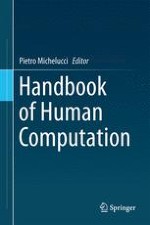2013 | OriginalPaper | Buchkapitel
Modeling Humans as Computing Resources
verfasst von : Yu-An Sun, Christopher Dance
Erschienen in: Handbook of Human Computation
Verlag: Springer New York
Aktivieren Sie unsere intelligente Suche, um passende Fachinhalte oder Patente zu finden.
Wählen Sie Textabschnitte aus um mit Künstlicher Intelligenz passenden Patente zu finden. powered by
Markieren Sie Textabschnitte, um KI-gestützt weitere passende Inhalte zu finden. powered by
